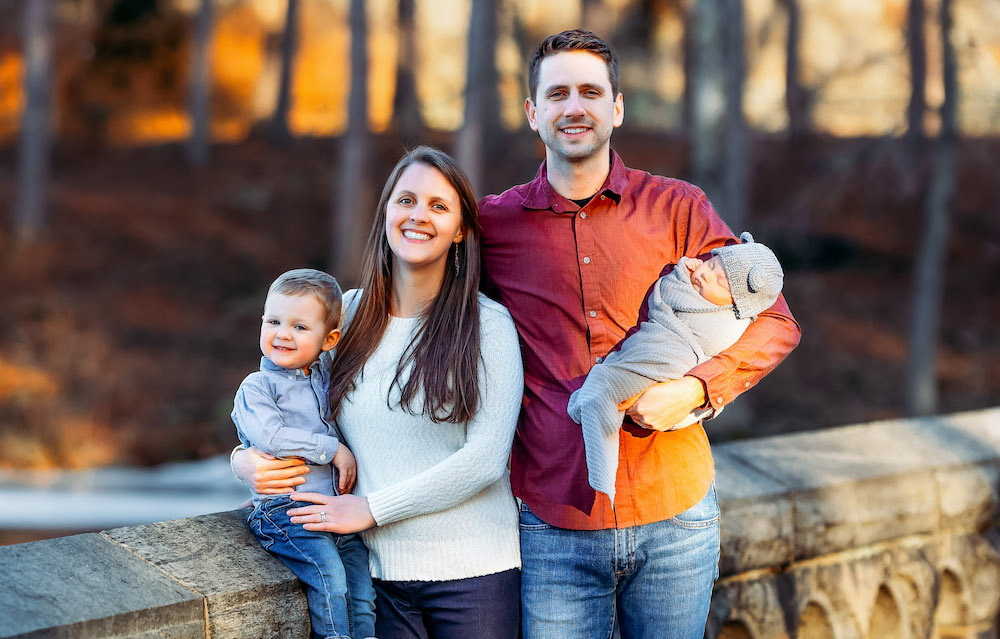Published: June 30, 2022

The upward trend in male presence in the military spouse community is uncovering a lack of inclusivity and representation. A recent article by Military OneSource raised concerns about male spouses’ feelings about isolation, public presumptions, and generalizations about gender roles.
Blue Star Families took this opportunity to speak to male spouses to gain a better understanding of how we can better serve the whole military spouse community. One such spouse was Matthew, married to an active-duty Army nurse, father of two, and a triathlete trainer.
A 2017 data release by the Department of Defense stated that 8% of active-duty spouses and 13% of Reserve spouses were male. By 2020, the same report had male active-duty spouse numbers at 9% and Reserve at 14%.
During the years Matthew has been a military spouse, he has noticed some different tendencies toward male spouses.
“I think it mostly boils down to the simple and unpleasant feeling of being invisible, of people not even realizing the existence of the male spouse,” explains Matthew. “Our lives and challenges are nearly the same as a military wife, yet people don’t see us.”
A common example he gives are online spouse social groups, which often start posts with “hey ladies.”
How often do we unconsciously address the military spouse population assuming they’re all female? Statistically, the majority of them are. However, speaking without gender compassion or neutrality alienates a growing population within the group.
“It makes the males feel unwelcome. It pushes males to keep to themselves and remain unseen, when they need the support of the entire community as much as anyone,” says Matthew.
Little research exists that explores the effects of military life for male spouses.What is available, however, are testimonials from male spouses like Matthew. He is unique because he also did something about it.
During the pandemic, like many other military spouses, Matthew’s sense of belonging to his community, and his ability to make connections, was hampered. A new parent, recently relocated, and no longer able to train triathletes, he wanted to find a way to connect all military spouses and achieve the sense of connectivity he craved. So, he created his own app.
“It started with Kovii, because as a stay-at-home new parent during a pandemic, I was very isolated. I wanted a way to let my closest friends and family know when my baby was in a good mood, and I was available and wanting to talk. A simple, virtual sign saying “I’m free!” explains Matthew. “I created this app, and shared it with the military community and they LOVED it … but … many couldn’t get their friends and family to download it because they didn’t understand it.”
Not to be dismayed, Matthew took notes and recommendations from the growing community of military spouses, male and female, that took interest in Kovii.The overwhelming request he received was a way to make new friends.
“I thought, well, you all understand the need for connection, I’ll just help you become friends with each other! I want to eliminate the feelings of loneliness and isolation that military spouses experience. With a community as large and strong as ours, there simply is no excuse,” says Matthew. “After nearly a year of trial and error, we now have a pretty cool compilation of events, programs, Facebook groups, and apps that really do help spouses form and maintain meaningful connections.”
In less than a year, Matthew’s Facebook group “Military Spouses - Meet New Friends,” has gained over 3,200 members, resulting in offshoot, individual military installation friend groups. He also created the MilSpocial program, directly connected to the main Facebook group, which has monthly virtual meet and greets. Similar to the popular Tinder app, it allows users to swipe left or right when finding friends with commonalities that they want to connect with. Essentially, Matthew has generated his own military social network.
Like Matthew’s work, creating a sense of belonging for military spouses is at the forefront of the Blue Star Families mission. In the 2021 Military Family Lifestyle Survey, only 30% of active-duty family respondents reported feeling a sense of belonging to their local civilian communities. And while we continue to provide national spouse outreach and local chapter events to bridge the divide, a combination of national and grassroots efforts, such as Matthew’s, is the only way to achieve long-term success for the military family community. Matthew adds, “Community is only as strong as the individual connections between the members of the community, and that is where [a] military social network specializes.”
Without continued efforts in this space, especially for isolated male spouses, the repercussions could be immense.
“On the light side, having friends is the best correlation to happiness in life. On the heavy side, depression and suicide is a major problem. We have suicide hotlines, professional counselors, and other resources that are working on prevention from the very end of the rope,” he explains. “I’m working on it from the foundation of people’s mental health. Many mental health situations never would have escalated into a situation had there been a close friend to talk to. It’s often as simple as people just need a chance to express themselves and be heard. Now when mental health diminishes despite having friends to vent to, with a friend those people are connected to a network of support who can refer and encourage them to get the help they need.”
Matthew is a male military spouse that took his feelings of invisibility and isolation and made a change for the whole military spouse community. Imagine the impact that more voices and action could have? One way you can make a difference is by becoming a Blue Star Volunteer and participating in Blue Star Families annual Military Lifestyle Survey. Fielding right now, the Survey provides insight to connectivity creators like Matthew and influences programs and outreach for organizations across the nation. Take the survey today!
Posted In: Military Family Lifestyle Survey

